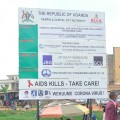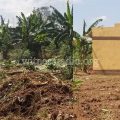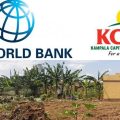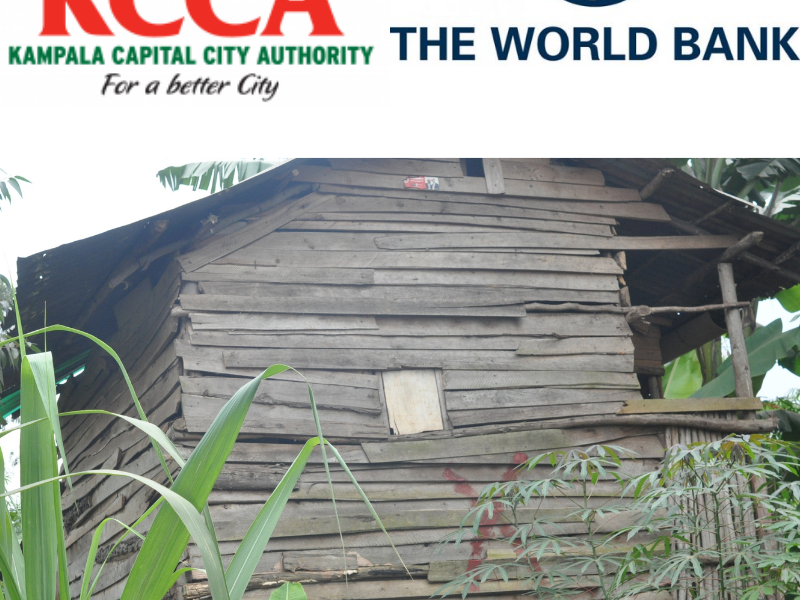Mr. Mutaasi’s house marked with “X” by KCCA for demolition.
By witnessradio.org Team
“…Ekuba omunaku tekya…”, loosely translated as “The rain that falls on a down-and-out is a relentless deluge,” is one of the adages applied among the Baganda, and its equivalent among the English is, “it never rains but it pours”, highlight the 12 years of misery of 42-year-old Mutaasi Ali.
Mutaasi, a resident of Kawaala zone II in Kampala had a dream of living a better life, but it has never turned out as he had envisioned it. His suffering started way back from the fire-outbreak that twice gutted his merchandise in the Owino-Park Yard market. A market that mothered the urban poor. That Market is no more. It was replaced with a gigantic mall whose construction was preceded by a brutal night of forced eviction carried out with impunity by Kampala Capital City Authority (KCCA). The Authority is the governing body and administers the Capital City of Uganda.
Now the ghosts of the past are back, he hardly sleeps. A nightmare of a looming eviction to give way to the expansion and construction of Lubigi-Channel under a World-Bank funded project, KIIDP-1or 2, pre-occupies his mind. And the outbreak of the pandemic is another setback that has kept him on tenterhooks waiting for the Covid-19 relief from the government.
The father of ten (10), has spent about a half of his age on the streets of Kampala trying out different odd jobs to feed his family.
Before the pandemic, he was a maid of all work. He gurgled busking, farming, singing, and playing aback-up artist role. Mutaasi who is now a backup artist moved from his home village in Mpigi town in Mpigi district, 50 km from the western side of Uganda’s capital Kampala for greener pasture in the capital at the age of 18.
“I was born to in an extended poor family; we had little chances of getting the basic needs we wanted because of being poor. I had to look for a livelihood elsewhere to support my needs and those of my family,” Mutaasi narrated.
Mutasi said a village friend who had come earlier in Kampala informed him of a job. “A friend of mine in Kamwokya, a Kampala suburb helped me to get it. It was a hawking job. I did it for about 4 years on the streets of Kampala. In 1997, we shifted to the Park Yard market,” he added.
When he was moved to Park Yard market, it was a great achievement. “Because we were expanding, and our second hand-clothing business was showing signs of success, he (my boss) decided we move to Park Yard since it was busier and had enough space. And after making some little money, I parted ways with him (my boss) and I started a similar business in the same market in 2004,” he added.
He was determined to learn and worked hard. He becomes an inspiration not only to his peers but also to his former coworkers. “Mutaasi was a promising bright child that everyone wanted to be with. We looked up to him for inspiration,” a close friend confirmed in an interview with Witness Radio.
His business continued to boom, but misfortune struck. Mutaasi and many other traders suffered big blows when merchandise, worth billions of Ugandan shillings was razed in the fire that first gutted the market in 2009.
“I had shopped a day before the fire, so I was left with nothing and no capital to start again with,” he said.
But as the saying of the Banna Kampala (people living in Kampala) that “Kampala kuyiiya,” literally meaning that to thrive in Kampala you have to hustle. Mutaasi and two of his friends moved onto the city streets as buskers with a reggae music version.
“I would practice singing in my free time and some friends of mine had described my voice as euphonious. Because I had nothing to do at home at that time, we formed a group of three, went to the streets, and started entertaining people. Some of us were even employed as backup artists during shows,” Mutaasi reveals.
He says the little money they earned helped them to cater to their needs. “At least on a good day, we could earn 6000 Shillings (USD 1.7) each, which I would use to look after my family in the village. In about a year, I had also saved some money and went back to Park Yard market to give selling clothes a second-shot,” he shares with a nostalgic look.
According to Mutaasi, initially, his business had failed to pick up, but the desire for better life kept him soldiering on.
“I had to limit on other roles, so I left the street entertainment and concentrated much on growing my business in Park Yard and recording music. Every single coin I would get from music would be invested in my second-hand clothing business,” he added.
Whereas it had grown, fire gutted the market on 31st July 2011 and destroyed traders’ merchandise worth millions of shillings. It did not spare his business either. And according to Mutaasi, this was the second fire in one year and subsequent fire outbreaks until Park Yard Market land was forcefully grabbed by KCCA, politically connected investors, and police in 2017 without any prior consultation or compensation.
“When this happened, I felt like I had lost my senses. Asking myself why I don’t succeed yet others do, and why my businesses collapse yet others stand the taste of time,” he recounts.
In an interview with the Sunday Monitor, a local newspaper in March 2017, Mr. Kiggundu acknowledged being behind the eviction of Park Yard vendors. He said he demolished the temporary structures at Park Yard to make it a better place. Mutaasi was left grasping at straws
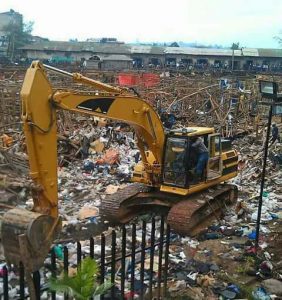
Helpless traders watch as their merchandise are destroyed by an excavator during an eviction in march 2017.
After a double loss, he had to pick up his broken pieces and focus on music and entertainment which had been his initial source of income, but the ghosts of the past continued to haunt him. In July 2020, a countrywide lock-down was imposed and the entertainment industry was hit hard. No concerts! No bars! No clubs! This was later lifted except for the entertainment industry.
Then when he thought the state would lift the ban on the music industry, there was a surge in COVID-19 cases, the government of Uganda imposed a second lockdown. This continued to pile misery upon him.
“Backing up other artists pays less and it is what I used to rely on now. We depend on God’s mercy to survive. I have not even received the government’s COVID relief ever since the lockdown started.” he added.
As he still recounts his ordeal; the misery in Park Yard market and the heart-wrecking lockdowns, the father of 10 is now facing forced eviction from his 27×40 piece of land by a World Bank-funded project. Mutaasi bought his piece of land 10 years ago from his hard-earned money.
In all that he has gone through his land without a doubt is being grabbed by Kampala Capital City Authority (KCCA) officials to pave way for the Lubigi primary channel expansion.
He said, “I started working in 1991. Look, my merchandise perished and the only thing I have is a piece of land that I have, and now is being taken away without any compensation.
“KCCA’s imminent eviction has taken me aback. I remember when I was evicted from a rental. I was verbally abused in front of my children, wife, and neighbors, my household items were thrown out and others confiscated. I was forced to move out of the house since the rent arrears had accumulated,” he shares the distressing memories. That day, he and the rest of the family had to brave the cold night outside. The following day, he could not bear the embarrassment and scorn that came with the eviction. He took it upon himself to construct a makeshift shelter, without walls, on his piece of land to temporarily serve as a house.
Good times may not last, but bad memories never fade, and Mutaasi, now penniless at the time, vividly remembers the price he had to pay to put up the make-shift shelter; “I had some sugarcane on the land, and on the second day, I requested my neighbors to give me eucalyptus poles to in exchange for the sugarcane. That is how I started a new life without a coin.”
He wonders why KCCA, the project implementer, is using the World Bank project to grab his land without being compensated. He is among the 120 households being evicted to pave away for the Lubigi drainage channel expansion project.
“You cannot tell me that you want my land on which you have found me living and you don’t want to compensate me for it. You want to take it and you don’t want to prepare for me who owns it. Why don’t they first prepare for the people affected by the project and then think of taking the land?” He questioned.
He also blames KCCA for the corrupt networks under the Buganda Land Board (BLB), a company that manages the Kabaka’s land who solicit money from them in rewards to a letter taken to KCCA to carry out the surveying and valuation of their property.
“We are required to clear UGX 250,000 (USD 70.46) for a letter proving your ownership in Mengo, the Busuulu (ground rent) of UGX 550,000 (USD 155), and UGX 150,000 (USD 42.28) to the chairman for the stamp. This is a lot of money that some of us don’t have. We are in a lockdown, and like me, I stopped working last year, where do they expect me to get all that money,” he further wondered.
He wonders what will happen if the others pay the BLB fee and is valued and surveyed but he fails to clear the fee. “It seems I am losing my land too, because if I lack what to eat, then where will I get the money to pay for the surveying and valuation,” he said.
He proposes that KCCA uses its money to survey and value his land, clear BLB, and then deduct it from the compensation money instead of losing the property they have worked for generations.
“I have suffered a lot and I feel I am tired…, he painfully concluded.
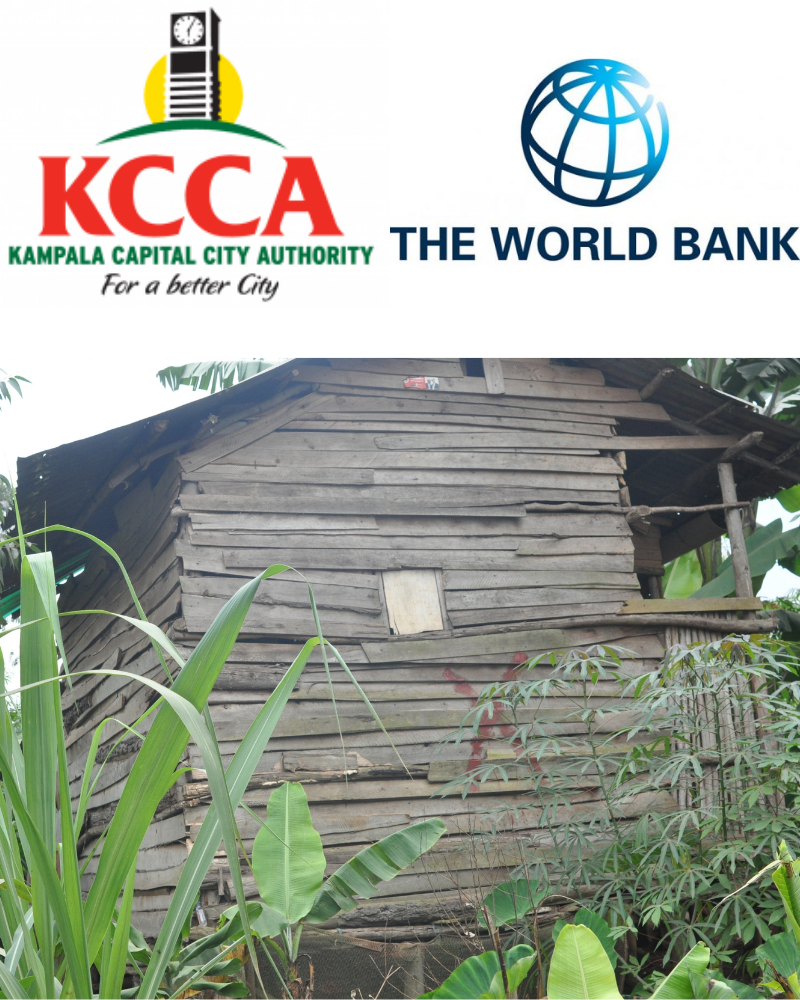

 MEDIA FOR CHANGE NETWORK1 week ago
MEDIA FOR CHANGE NETWORK1 week ago
 MEDIA FOR CHANGE NETWORK2 weeks ago
MEDIA FOR CHANGE NETWORK2 weeks ago
 FARM NEWS2 weeks ago
FARM NEWS2 weeks ago
 MEDIA FOR CHANGE NETWORK5 days ago
MEDIA FOR CHANGE NETWORK5 days ago
 MEDIA FOR CHANGE NETWORK5 days ago
MEDIA FOR CHANGE NETWORK5 days ago
 MEDIA FOR CHANGE NETWORK2 days ago
MEDIA FOR CHANGE NETWORK2 days ago
 MEDIA FOR CHANGE NETWORK4 hours ago
MEDIA FOR CHANGE NETWORK4 hours ago

